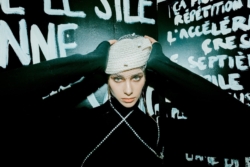When was your art practice born? What inspires you?
I have always been really interested in cameras. I think that interest sort of inspired my love of technology, and my love of art. I used to watch the world through little cameras I had when I was a child. I’m not really sure why I did that, I think my interest in the whole idea of capturing a version of reality inspired me to keep getting better at it and it spiralled from there. I was making very dark films, in retrospect, as a child, but they never felt taboo, just something I did for fun. They’ve always felt like a pretty healthy expression. I’ve had people say “if you didn’t make the art you make I think you might be a serial killer” and while I don’t think that’s true, I do acknowledge that there’s a darkness in me that I think I’ve found a pretty good outlet for. We all have that in us, it’s like a residual rage we once used to kill our prey or our rivals in the pre-Neolithic.
In your photos you tell about bodies and transformations, what do these themes mean to you?
The transforming body is inevitable, we get older and then die, and that can be endlessly inspiring to anyone who can manage their fear enough to really examine that. I suppose what I try to do is elevate the body to a kind of cosmic version of itself. It’s a kind of meditation process, to get insight into the body as a result of a whole lot of things coming together in a profound way. I try to think about everything that exists, where it’s come from and where it’s all going. I struggle sometimes with steering the work, which is a result of that thinking, in the direction I feel best embodies what I’m thinking about. Usually the work has mysteries of its own, though. There’re things that become clear through making that otherwise may have stayed hidden to an artist, that’s part of what drives me to keep creating.
In your art there is a long process of post production and composition creation, how do you combine these different practices?
I think that’s mostly just practice, and having an eye for a good composition. There are only so many angles you can shoot yourself from with a timer, because you have to maintain fairly strict control over your aperture and shutter to make compositing work. I don’t do drawings, and I very rarely do mock ups, because a photoshop document is in many ways a mock up of itself, until it’s more refined. One of the biggest freedoms of using compositing software is being able to rearrange your entire composition at any point. I have some friends who are also photographers who talk about having a back catalogue of images they need to get around to editing, but my way of working is kind of the opposite. I shoot to finish the composition, adding elements gradually that I think it needs. That’s been one of the challenges for me to overcome. Shooting in a very structured way does encourage a sameness in your work, because you’re limiting opportunity for happy accidents and shooting variables to make things interesting. Making art is often a form of waiting, for the right moment or idea to strike, and then having the experience to know how to act on those ideas.
 https://www.nastymagazine.com/wp-content/uploads/2023/03/Photo-26-03-2023-11-37-02.jpg
1205
1600
Editor Nasty
https://www.nastymagazine.com/wp-content/uploads/2015/02/new-logo-basker-WHITE4.png
Editor Nasty2023-03-31 12:19:092023-03-31 12:44:21Curses / Live at The Lower Third
https://www.nastymagazine.com/wp-content/uploads/2023/03/Photo-26-03-2023-11-37-02.jpg
1205
1600
Editor Nasty
https://www.nastymagazine.com/wp-content/uploads/2015/02/new-logo-basker-WHITE4.png
Editor Nasty2023-03-31 12:19:092023-03-31 12:44:21Curses / Live at The Lower Third


















